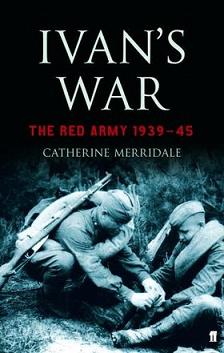
Ivan's War
Catherine Merridale
396 pages including index
published in 2005
Though things have improved a lot since the end of the Cold War, the Eastern Front is still underrepresented in western histories of World War II. Quite naturally British and American historians have focused mostly on their own countries' experiences in the war but even so the Russian experience is still under-represented. And often when the Eastern Front is looked at, it is from a German rather than a Russian perspective. German historians, generals and others were quite quick in putting forward their experiences in order to put the record straight in their favour, German sources were much more available to western historians than Russian sources, stuck behind the Iron Curtain as they were. So we got plenty of Konsalik novels talking about poor, intelligent middle class German officers stuck in the hell of the Ostfront facing the Slavic hordes, not so much about the poor Russian soldiers trying to liberate their homelands. What's more, Cold War ideology, which presented an outnumbered NATO alliance trying to defend itself against the vast communist tank armies poised to overrun Western Europe at any moment, quite easily identified itself with the German experience and was fed by the same German generals that had been defeated by the Russians on how best to fight the bolshevik menace.
So it's good to see a book like Ivan's War be published. It's the first book I've read about the Eastern Front that looks at the war there not just through a Russian perspective, but looks at the ordinary soldier's experiences, somewhat comparable to e.g. Stud Terkel's "The Good War" about American experiences of WWII. Catherine Merridale went to Russia not just to look at archives long inaccessible to western scholars, but also to talk to the veterans themselves and get their stories. What's more, she didn't just show the stories of the common soldiers, but also those of their officers and political commissars too and does so without editorialising. It's important to hear those stories, to get an idea of what the Great Patriotic War was really like for those who fought it, without seeing it filtered through American or Western European, let alone German eyes for a change.
But, as she makes clear, there are some unique difficulties in writing such a book about Soviet soldiers. Our own western view of World War II may have its distortions, but there never quite was a systemic effort to bring it in line with government ideology, to proof the legitimacy of an entire way of life, which is what happened in Russia. From the start of the war certain embarassing truths have been airbrushed away and have only been open for discussion in the last few decades and even then it's controversial. Many of the veterans themselves have completely embraced the idea of WWII as the Great Patriotic War, with everybody standing firm behind Stalin. The realities of their wartime experiences has often been replaced by this much more comforting myth.
The reality was of course that the Soviet Union was completely unprepared for the German attack, struggled for a long time to come up with the right strategies and tactics to stop and defeat the nazis, that Stalin like Hitler would later send hundreds of thousands of hard to replace soldiers to death or captivity by ordering them to defend the indefensible. The lifes of ordinary soldiers never was a real consideration in the general staff's plans, while equipment and weaponry was often lacking, especially in the early years with the USSR still on the defence.
The average soldier and officer both therefore had a much harsher time of it then their western or even German counterparts. He or she -- because many more women fought in the Russian armed forced than they did in any other army -- didn't often even have the comfort of the company of friends and comrades, because the casuality rate was so high that the sort of close knit platoons familiar from Hollywood war movies rarely could happen. It's no wonder therefore that many veterans after the war rather believed the governmentally ordained myths than their own realities, especially after the war receded further and further into memory.
Ivan's War is a good corrective to the standard, German inspired view of the war on the East Front of technologically superior nazi superwarriors against overwhelming Asiatic hordes of barbaric soldiers who knew no pain or fear winning the war just through sheer numerical weight. It gives the Soviet soldier a face, an identity other than that of the enemy that first the nazis and then our own Cold War ideology wanted to reduce him to.
Webpage created 19-12-2011, last updated 25-01-2012.